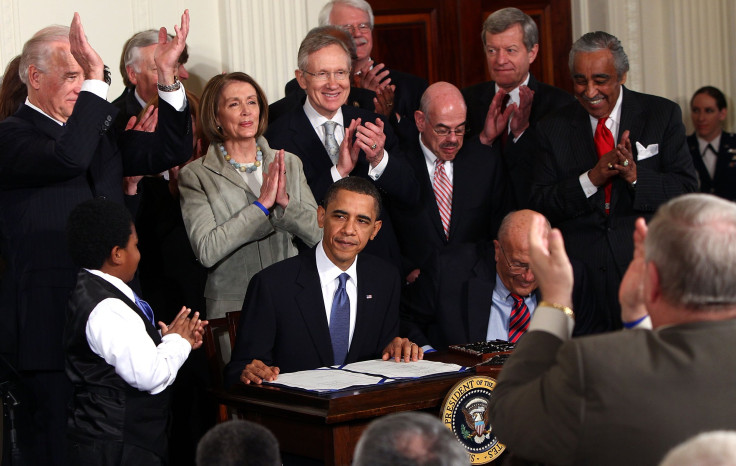Is Obamacare Working? 3 Years After Opening, Healthcare.gov Exchange Remains Under Scrutiny

Saturday marks the three-year point since the opening of the Obamacare health insurance exchange at healthcare.gov. Officially called the Patient Protection and Affordable Care Act (ACA), the landmark piece of legislation introduced and signed into law by President Barack Obama has aimed to overhaul health insurance in the United States and ensure coverage for nearly all Americans.
But while the federal health insurance has suffered a number of stumbles and setbacks since it became law, it doesn't appear close to meeting its demise, something once predicted by Republican opponents of Obamacare. In fact, while it has been criticized by some for being too expensive, a survey released last month found the opposite for workers employed full-time. The Kaiser Family Foundation determined that "93 percent of firms with at least 50 employees offer health benefits to at least some employees, and the vast majority say their coverage meets the ACA’s requirements for value and affordability."
The intent of the law, which Obama signed March 23, 2010, seems to be working, too. The number of U.S. citizens who have health insurance has been on the steady uptick, according to a press release from the U.S. Census Bureau. The increases coincided with the start of Obamacare, as the "rate of private coverage increased by 1.2 percentage points to 67.2 percent in 2015, and the government coverage rate increased by 0.6 percentage points to 37.1 percent," the Census Bureau wrote.
Still, a number of major health insurance providers have begun bailing on the law, claiming they're not making profits in Obamacare marketplaces. If enough insurance providers follow suit, that could push the cost of premiums -- the price paid monthly by those with coverage -- much higher than the varying rates are now. In a worst case scenario, many people could be left with few choices, most of which would likely also be more expensive.
Another potential drawback to Obamacare is its susceptibility to fraud. Government investigators recently applied for -- and got -- Obamacare health insurance using names of people who do not exist, CNBC reported last month. Fictional people who indicated they hadn't paid their taxes -- a factor that precludes people from Obamacare -- were still able to receive tax credits that can be applied to premium costs.
There has also been some federal malfeasance associated with Obamacare. A new report from the Government Accountability Office found the Obama administration is routing payments to health insurers and not the U.S. Department of Treasury, which is a crime, Politico reported Thursday.
Republicans, who have long said Obamacare is illegal and would be a veritable doomsday on the economy, pounced at the news. "This new opinion from the government’s top watchdog confirms that the Obama administration is not above the law,” the House Energy and Commerce Committee's Republican members said in an official statement. "The administration needs to put an end to the Great Obamacare Heist immediately."
Nearly half of all Americans do not approve of Obamacare, according to an average of multiple public polls calculated by Real Clear Politics. That sentiment is in spite of Obamacare not costing any more than other health insurance, according to a new report. The ACA commands an average premium price that is about 10 percent lower than the average of other providers, NBC News reported.
The upcoming presidential election will also factor in the future of Obama's healthcare law. Republican nominee Donald Trump says he will "repeal and replace Obamacare. Conversely, Democratic nominee Hillary Clinton has pledged to "continue to improve the Affordable Care Act. I will work to get the costs down, premiums, co-pays, deductibles, prescription drug costs."
Open enrollment for Obamacare in 2017 is set to begin next month and lasts through the end of January.
© Copyright IBTimes 2024. All rights reserved.












